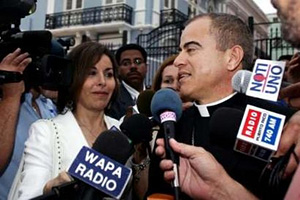 |
 |
 |
 Editorials | At Issue | May 2006 Editorials | At Issue | May 2006  
Puerto Rico, Bankrupt American Island
 Laurent Mauriac - Libération Laurent Mauriac - Libération


| | San Juan Archbishop Monsignor Roberto Gonzalez Nieves (R) talks to the media at his arrival to the special commission meeting in the Governor's mansion in San Juan, Puerto Rico, May 10, 2006. Archbishop Gonzalez originated the idea of the special consensus commission to find a way to end a partial government shutdown that has left about 95,000 public workers in the streets. (Reuters/Ana Martinez |
This dependency's paralysis provokes little response in the United States.

An American territory with close to four million inhabitants has suspended all payments. Parts of public services have been shelved; schools have been closed, and close to 100,000 people have stopped working in the last week. Yet the situation barely provokes any response in the United States: no official reaction, very limited media coverage.

The territory in question is not an American state, but an island with a weird status. Puerto Rico is part of the United States, but has its own flag, its constitution, and its own team at the Olympic Games. Its head of state is the President of the United States, but its citizens have no vote to elect him, even though they are American citizens and may move and work freely within American territory. Puerto Rico is a "commonwealth" of the United States, enjoying the same status as the Virgin Islands and Guam.

Confrontation

The crisis has been provoked by a dispute between the governor and the legislature over the establishment of a consumption tax that would allow a new loan to be guaranteed. "More than anything else, the situation reveals the dysfunction of the island's government," deems Cesar Perales, president of the Puerto Rican Legal Defense and Education Fund, an association for the defense of Puerto Ricans' rights in the United States. "That's the consequence of a political confrontation between the two parties on the budget and taxation." Since the beginning of the blockage on May 1st, the public company for the promotion of tourism has assured that the island is "always open for tourism" in unchanged conditions of "security and comfort." Since then, demonstrations in the island's principal city, San Juan, follow one another in rapid succession.

The absence of almost any discussion of the situation in the United States doesn't surprise Rodolfo de la Garza, Political Science professor at Colombia University and a good expert on the island: "Puerto Rico has never interested the United Sates. The American public is not informed." This situation is linked to the island's status, which, according to the professor, is an example, "of the worst kind of colonialism."

Status Quo

Nonetheless, several referendums organized in the last twenty years demonstrate that the majority of residents support the status quo, closely followed by those who hope the island will become an American state. Pro-independence supporters constitute a small minority who fear such an integration more than anything else.

"Many people believe that if Puerto Rico became an American state, they would lose their identity," explains Cesar Perales. And so they make do with this wonky status. "If you consider that it's the poorest place in the United States, you could think it doesn't work," he judges. "But if you observe that Puerto Rico is in a better situation than the rest of Latin America, you tell yourself the opposite."

Today, the United States meddles as little as possible in the island's affairs. And does nothing to resolve the present political-financial crisis. "An intervention would be possible if public health or security were threatened," Cesar Perales believes. "That's not the case today."

Translation: t r u t h o u t French language correspondent Leslie Thatcher. | 
 | |
 |



